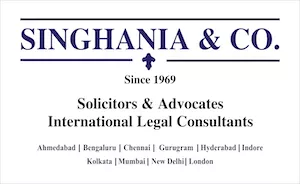- within Corporate/Commercial Law topic(s)
- within Corporate/Commercial Law topic(s)
- within Corporate/Commercial Law, Criminal Law and Insolvency/Bankruptcy/Re-Structuring topic(s)
- with readers working within the Healthcare, Retail & Leisure and Law Firm industries
Introduction
In accordance with Regulation 23(2), (3), and (4) of the Securities and Exchange Board of India ("SEBI") (Listing Obligations and Disclosure Requirements) Regulations, 2015 ("LODR Regulations"), prior approval from the audit committee and shareholders is required for Related Party Transactions ("RPTs") undertaken by the listed entities. To further facilitate informed decision-making, section III-B of the SEBI Master Circular dated November 11, 2024, ("Master Circular") mandates detailed information disclosure regarding RPTs for review and approval.
Now in line with that, on February 14, 2025, SEBI has introduced the Industry Standards on "Minimum information to be provided for review of the audit committee and shareholders for approval of RPT" ("Industry Standards") that outline the minimum level of information that all the listed entities must provide, while seeking approval for the RPTs proposals. Developed by the Industry Standards Forum (ISF), these standards aim to streamline and expedite the process while ensuring fairness, accountability, transparency and compliance across the market.
Further, in addition to the information previously mandated by the Companies Act, 2013 ("Act"), the explanatory statement that goes with notices addressed to shareholders requesting approval for any RPT will now contain additional information. On April 1, 2025, the new disclosure obligations will go into force.
Who is a related party and what are the related party transactions?
"Related party" refers to a related party as defined by sub-section (76) of section 2 of the Act or by the relevant accounting standards, as per Regulation 2(1) (zb) of the LODR regulations.
With the proviso that:
- any person or entity that is a member of the listed entity's promoter or promoter group; or
- any person or entity that owns equity shares in the listed entity: (a) of twenty percent or more; or (b) of ten percent or more, effective April 1, 2023, either directly or on a beneficial interest basis as stipulated under section 89 of the Act, at any point during the fiscal year that just ended, shall be considered a related party.
With the additional proviso that units issued by mutual funds that are listed on a recognized stock exchange or exchanges will not be covered by this definition.
According to section 2 (76) of the Act, "related party", with reference to a company, means –
- a director or his relative;
- a key managerial personnel or his relative;
- a firm, in which a director, manager or his relative is a partner;
- a private company in which a director or manager or his relative is a member or director;
- a public company in which a director or manager is a director and holds or holds along with his relatives, more than two per cent of its paid-up share capital;
- any body corporate whose Board of Directors, managing director or manager is accustomed to act in accordance with the advice, directions or instructions of a director or manager;
- any person on whose advice, directions or instructions a director or manager is accustomed to act.
However, nothing in sub-clause (vi) and sub clause (vii) shall apply to any advice, instruction or direction given in a professional capacity;
- any body corporate which is – (a) a holding, subsidiary or an associate company of such company; (b) a subsidiary of a holding company to which it is also a subsidiary; or (c) an investing company or the venturer of the company;
- director other than an independent director or key managerial personnel of the holding company or his relative with reference to a company, shall be deemed to be a related party.
Explanation– For the purpose of this clause, "the investing company or the venturer of a company" means a body corporate whose investment in the company would result in the company becoming an associate company of the body corporate.
According to Regulation 2(1) (zc) of LODR Regulations, a RPT is any transaction in which resources, services, or obligations are transferred between:
- a listed entity or any of its subsidiaries and a related party of the listed entity or any of its subsidiaries on the one hand; or
- a listed entity or any of its subsidiaries on one hand and any other person or entity on the other hand, with the intention and result of which is to benefit a related party of the listed entity or any of its subsidiaries, with effect from April 1, 2023; regardless of whether a fee is assessed, a "transaction" with a related party is interpreted to include a single transaction or a series of transactions in a contract.
According to Section 188 of the Act, and Rule 15 of the Companies (Meetings of Board and its Powers) Rules of 2014, the following are RPTs and its threshold limits:
| Nature of contract or arrangement with the related party | Threshold limit (The audited financial accounts from the previous financial year will be taken into account for calculating turnover or net value.) |
| Sale, purchase or supply of any goods or materials | 10% or more of the turnover |
| Selling or otherwise disposing of, or buying, property of any kind | 10% of net worth of the company |
| Leasing of property of any kind | 10% or more of the turnover |
| Availing or rendering of any services | 10% or more of the turnover |
| Appointment of any agent for purchase or sale of goods, materials, services or property | 10% or more of the turnover |
| Such related party's appointment to any office or place of profit in the company, its subsidiary company or associate company | Monthly renumeration exceeding INR 2,50,000/- |
| Underwriting the subscription of any securities or derivatives thereof, of the company | Renumeration increasing 1% of the net worth |
Applicability of Industry Standards
The Industry Standards apply to the following types of RPTs:
- Material RPTs as defined under Regulation 23(1) & (1A) of LODR Regulations.
- Transactions exceeding specific financial
thresholds:
- 2% of turnover based on the last audited consolidated financial statements.
- 2% of net worth, unless net worth is negative.
- 5% of the average absolute value of profit/loss after tax over the last three audited years.
A Transaction is considered as a material transaction with a related party, if:
- The aggregate value exceeds INR 1,000 crore or 10% of the annual consolidated turnover of the listed entity (whichever is lower).
- Transactions related to brand usage or royalty exceed 5% of the annual consolidated turnover of the listed entity.
- Transactions that have a significant financial impact on the company's balance sheet.
Classification of Disclosures:
- Comprehensive Disclosures- All disclosures specified in paragraph 4 of the Master Circular.
- Limited Disclosures- All disclosures specified in paragraph 4 of the Master Circular except certain line items.
- Minimum Disclosure- All disclosures as specified in Rows A(1), A(2), A(4), A(5) and B(1) of paragraph 4 of these Industry Standards, as applicable to relevant RPT.
|
Approval and Disclosure Matrix |
|||
| Type of Transaction | Threshold | Approval Required | Disclosure Requirement |
| Material RPT | As defined under Regulation 23(1) & (1A) of LODR Regulations and as given above | Audit Committee + Shareholders | Comprehensive Disclosures; for both balance sheet and P&L items |
| RPT with promoter or promoter group | Exceeding the threshold as given above in point 2 | Audit Committee | Comprehensive Disclosures; for both balance sheet and P&L items |
| Less than the threshold as given above in point 2 | Audit Committee | Comprehensive Disclosures for balance sheet; and Limited Disclosures for P&L items | |
| Residual RPT (exceeding ₹1 crore) | ₹1 crore or more | Audit Committee | Limited Disclosures; for both balance sheet and P&L items |
| Residual RPT (below ₹1 crore) | Below ₹1 crore | Minimum Disclosures | |
Evaluation of RPT Industry Standards' Disclosure Requirements:
Paragraph 4 of the Industry Standards include multiple line items divided into two parts, that are, Part A and Part B:
Part A-
Information about each related party is included in Part A of
the paragraph 4 of the Industry Standards, regardless of the number
or value of transactions. Parts A1 to A4 of the paragraph 4 call
for historical information about the related party in question
(such as elaborate KYC) and any transactions that have been made
with them.
The total value of the planned transactions—that is, all the
transactions combined—as well as additional information
pertaining to a specific related party must be included in Part A5
of the paragraph 4. As a result, the information in A1 to A5 can be
given according to the party.
Part B-
The details under Part B are to be provided transaction wise. For the audit committee's approval, Part B(1) mandates that the listed entity or its subsidiary provides the fundamental terms of each RPT entered into with the related parties.
Part B(2) to Part B(8) contain more details for specific types of RPT as are specified by the Industry Standards. These include transactions involving the purchase or sale of goods and services, loans, advances, investments, borrowings, royalties, the sale or lease of a unit, division, or undertaking, and more. These details must be provided to the audit committee at the time of approval. The Company must decide which section of B2 to B8 should be provided for a given transaction based on its nature.
Role of audit committee and the management
For the audit committee to review and comment on each of the line items as given in the Industry Standards, the management must submit information or comments that must be included in the minimum information disclosures presented to the audit committee. The audit committee may give omnibus approval, if the same is directly being sought by the Company.
The CEO or CFO and the promoter directors must attest that the terms and conditions of the transactions are not detrimental to the listed firm and that they do not conflict with the interests of the public. On few cases, the Audit Committee has been asked for specific remarks. The Audit Committee's minutes must include such remarks.
Disclosure requirement for the shareholders
The explanatory statement in the notice of shareholders must include all pertinent information for each material RPT as per paragraph 4 of the Industry Standards, as well as any remarks made by the board of directors or audit committee. Commercial secrets and other information that could impact the listed entity's ability to compete can be redacted from shareholder disclosures with the Audit Committee's approval.
Additionally, the Audit Committee will attest that, in its opinion, redacted disclosures still give the public shareholders all the information they need to make educated decisions.
Conclusion
By standardizing the information required for RPT approvals, these industry standards ensures that RPTs are undertaken in the best interest of shareholders while aligning with SEBI's regulatory framework. The Audit Committee's decision-making and record-keeping will need to be more thoughtful and informed. Further, the listed entities must adhere strictly to these requirements to maintain investor confidence and regulatory compliance.
The content of this article is intended to provide a general guide to the subject matter. Specialist advice should be sought about your specific circumstances.



